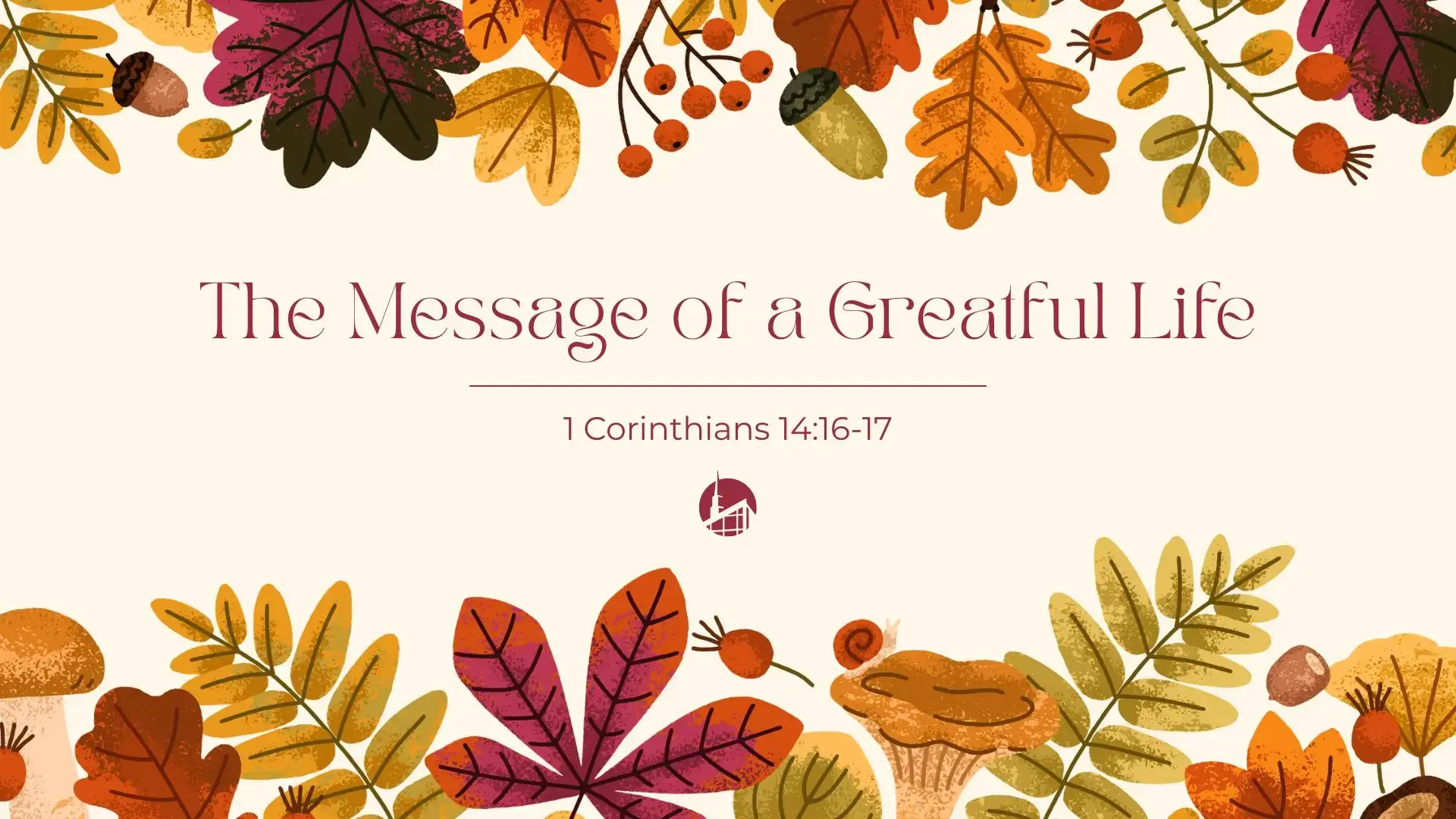In a society often marked by complaints and dissatisfaction, the call to live a life of gratitude stands out as a powerful testimony to God’s goodness. Pastor Léveillé’s sermon, based on 1 Corinthians 14:16-17, reminds us that a grateful life is not only a personal blessing but also a witness to others. Drawing from the context of spiritual gifts in the Corinthian church, this message explores how our words and actions can reflect God’s love, edify those around us, and draw others closer to Him. Below, we unpack three key principles from the sermon: speaking in ways that multiply the “amens,” using thanksgiving to build others up, and letting gratitude draw others toward God.
Speaking in Ways That Multiply the “Amens” (1 Corinthians 14:16)
The Bible says in 1 Corinthians 14:16, “Else when thou shalt bless with the spirit, how shall he that occupieth the room of the unlearned say Amen at thy giving of thanks, seeing he understandeth not what thou sayest?” In the Corinthian church, some believers were using spiritual gifts, like speaking in tongues, without interpretation, leaving others unable to understand or respond. Paul emphasizes the importance of clear, understandable communication that allows others to join in agreement, saying “Amen” to the truth of God’s goodness.
A grateful life does the same. When we express genuine thanksgiving, it invites others to affirm God’s work in our lives. Whether it’s sharing how God has provided, comforted, or saved us, our words should inspire those around us—especially those who don’t yet know Christ or are young in faith—to recognize His greatness. Our gratitude becomes a spiritual fragrance, as described in 2 Corinthians 2:15, “For we are unto God a sweet savour of Christ, in them that are saved, and in them that perish.” By speaking in ways that are clear and heartfelt, we create opportunities for others to say, “Amen, God is good!”
Consider the impact of our words on those closest to us, especially children. If our conversations are filled with complaints, we risk teaching the next generation that life is bleak and God is distant. Instead, let’s share stories of God’s faithfulness, like His unending mercies (Lamentations 3:22-23) or His strength in our weakness. A life of gratitude multiplies “amens” by pointing others to the God who loves and saves.
Use Thanksgiving to Build Others Up (1 Corinthians 14:17)
In 1 Corinthians 14:17, Paul writes, “For thou verily givest thanks well, but the other is not edified.” The Corinthians’ misuse of tongues meant their thanksgiving, though sincere, didn’t benefit others because it wasn’t understandable. Paul urges believers to ensure their gratitude builds up the church. When we share our thankfulness in ways others can grasp, it encourages and strengthens those around us.
This principle applies beyond the church walls. Imagine the effect of a grateful attitude at work, school, or home. A teacher who begins a class with a story of God’s provision can lift the mood of the entire room. A parent who expresses thanks for small blessings, like time spent together in traffic, can shape a child’s outlook on life. The sermon recounts the story of Corrie and Betsy ten Boom, who thanked God for fleas in a Nazi concentration camp because those fleas kept guards away, allowing Bible studies that led many to Christ. Their gratitude, rooted in 1 Thessalonians 5:18 “In every thing give thanks” transformed a dire situation into an opportunity for God’s grace to shine.
Our thanksgiving should be intentional, not just a private prayer but a public testimony that uplifts others. By sharing how God has worked in our lives, we create a ripple effect, encouraging those around us to see His hand in their own circumstances.
Let Gratitude Draw Others Toward God (1 Corinthians 14:1, 24-25)
Paul begins 1 Corinthians 14:1 by saying, “Follow after charity, and desire spiritual gifts, but rather that ye may prophesy.” In verses 24-25, he explains that clear communication of God’s truth can lead the unbeliever or unlearned to worship, declaring, “God is in you of a truth.” A life of gratitude serves this purpose—it becomes a sermon in itself, pointing others to Christ.
When we overflow with thanksgiving, we reflect God’s love and goodness, drawing others closer to Him. The sermon shares the example of Scott McCauley, who invited strangers to Thanksgiving dinner for 33 years, creating a space where people felt valued and could share their own gratitude. His actions mirrored the love of Christ, showing how a grateful heart can touch lives. Similarly, our daily expressions of thanks can reveal God’s character to those who don’t yet know Him.
For those who haven’t received Christ, the message is clear: God’s love is so great that He gave His only begotten Son (John 3:16). This gift of salvation is the ultimate reason for our gratitude. By living out this truth, we become a “sweet savour of Christ,” inviting others to experience His love and grace.
Conclusion
A grateful life is a powerful testimony. It multiplies “amens” by inviting others to affirm God’s goodness, builds up those around us through shared thanksgiving, and draws people toward the God who loves them. As Pastor Léveillé challenged, what message does your life transmit? Let it be one of gratitude, proclaiming that “God is good” in every circumstance. May our words and actions reflect the truth of Psalm 107:1, “O give thanks unto the LORD, for he is good: for his mercy endureth for ever.”












